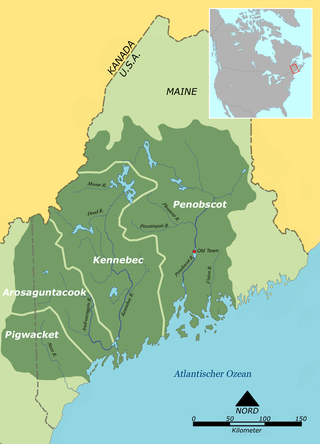
The Abenaki are an Indigenous people of the Northeastern Woodlands of Canada and the United States. They are an Algonquian-speaking people and part of the Wabanaki Confederacy. The Eastern Abenaki language was predominantly spoken in Maine, while the Western Abenaki language was spoken in Quebec, Vermont, and New Hampshire.

Swanton is a town in Franklin County, Vermont, United States. The population was 6,701 at the 2020 census. The town includes the village of Swanton.

Potton is a township municipality of about 2,010 people in the Memphrémagog Regional County Municipality. It is located on the western shore of Lake Memphremagog in the Estrie region of Quebec, and is one of the municipalities in Brome County. Potton is located about 125 kilometres (78 mi) southeast of Montreal, 30 kilometres (19 mi) to the southwest of the city of Magog, and next to the United States border, north of North Troy, Vermont.

The Missisquoi River is a transboundary river of the east shore of Lake Champlain, approximately 80 miles (130 km) long, in northern Vermont in the United States and southern Quebec in Canada.
State-recognized tribes in the United States are organizations that identify as Native American tribes or heritage groups that do not meet the criteria for federally recognized Indian tribes but have been recognized by a process established under assorted state government laws for varying purposes or by governor's executive orders. State recognition does not dictate whether or not they are recognized as Native American tribes by continually existing tribal nations.
The Pennacook, also known by the names Penacook and Pennacock, were an Algonquian-speaking Indigenous peoples of the Northeastern Woodlands who lived in Massachusetts, New Hampshire, and southern Maine. They were not a united tribe but a network of politically and culturally allied communities. Penacook was also the name of a specific Native village in what is now Concord, New Hampshire.

The Pocomtuc were a Native American tribe historically inhabiting western areas of Massachusetts.

Odanak is an Abenaki First Nations reserve in the Central Quebec region, Quebec, Canada. The mostly First Nations population as of the Canada 2021 Census was 481. The territory is located near the mouth of the Saint-François River at its confluence with the St. Lawrence River. It is partly within the limits of Pierreville and across the river from Saint-François-du-Lac. Odanak is an Abenaki word meaning "in the village".

Saint-François-du-Lac is a community in the Nicolet-Yamaska Regional County Municipality of Quebec, Canada. The population as of the Canada 2011 Census was 1,957. It is located at the confluence of the Saint Lawrence and Saint-François rivers, at the edge of Lac Saint-Pierre.

Abenaki, also known as Wôbanakiak, is an endangered Eastern Algonquian language of Quebec and the northern states of New England. The language has Eastern and Western forms which differ in vocabulary and phonology and are sometimes considered distinct languages.

The Wabanaki Confederacy is a North American First Nations and Native American confederation of four principal Eastern Algonquian nations: the Mi'kmaq, Maliseet (Wolastoqey), Passamaquoddy (Peskotomahkati) and Penobscot. The Western Abenaki are also considered members, being a loose identity for a number of allied tribal peoples such as the Sokoki, Cowasuck, Missiquoi, and Arsigantegok, among others.

The Androscoggin were an Abenaki people from what are now the U.S. states of Maine and New Hampshire. By the 18th century, they were absorbed by neighboring tribes.

Gray Lock, was a Western Abenaki warrior chieftain of Woronoco/Pocumtuck ancestry who came to lead the Missisquoi Abenaki band, and whose direct descendants have led the Missisquoi Abenaki until the current day. Born around 1670 near what is now Westfield, Massachusetts, he eventually became the most illustrious and prominent leader to arise among the dwindling Waranoak, once the predominant original inhabitants of the central Connecticut River Valley in today's New England region.
State v. Elliott, 616 A.2d 210, is a decision of the Vermont Supreme Court holding that all aboriginal title in Vermont was extinguished "by the increasing weight of history." The Vermont Supreme Court has clarified that its holding in Elliott applies to the entire state.
The Nulhegan Band of the Coosuk Abenaki Nation is a state-recognized tribe and nonprofit organization, called AHA "Abenaki Helping Abenaki", whose headquarters and land are based in Vermont. They are often referred to as the Nulhegan Abenaki Tribe or simply, Nulhegan.

The Cowasuck, also known as Cowass, was an Algonquian-speaking Native American tribe in northeastern North America, linguistically and culturally belonging to the Western Abenaki as well as being members of the Abenaki Confederation. Today, the Cowasuck Band of the Pennacook-Abenaki People also known as Cowass North American, a nonprofit corporation, is not state recognized, and claims to be the encompassing organization of these peoples descendants. The Koasek Abenaki Tribe of Vermont, the Nulhegan Band of the Coosuk Abenaki Nation(state recognized by VT) and The Ko’asek (Co’wasuck) Traditional Band of the Sovereign Abenaki Nation,(NH offers no state recognition) are also non Federally recognized Native American/Abenaki cultural heritage organizations which attach variations of the Cowasuck appellation as entities..
The Koasek Abenaki Tribe is a state-recognized tribe in Vermont, who claim descent from Abenaki people.
The Missisquoi Abenaki Tribe is one of four state-recognized tribes in Vermont, who claim descent from Abenaki people. The Missisquoi Abenaki Tribe specifically claims descent from the Missiquoi people.
Jeanne Brink is an Abenaki artist who specializes in traditional basket making, and the cultural and linguistic preservation of the Abenaki people.












